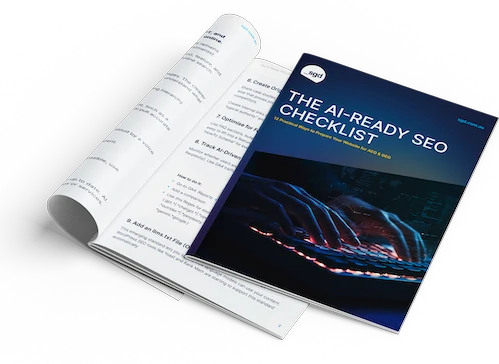When it comes to search engine optimisation (SEO), there can be a lot of jargon to navigate and conflicting advice – especially when it comes to keyword research.
From ‘SERP’ and ‘crawling’ to ‘backlinks’ and ‘indexing’, SEO is a language that can be hard to translate when you’re not in the digital marketing world.
But if you’re interested in or actively investing in SEO, it’s essential to understand some common terms to assess your campaign’s performance.
Learning about how to choose SEO keywords is a great place to start.
Knowing what SEO keywords are and how to choose the best keywords for your campaign can be the difference between campaign success and failure.
In this blog, I’ll explain the complexities of SEO keywords and answer questions like: What are keywords? Why do they matter for SEO? And how do you choose the best keywords for your business?
For a personalised SEO roadmap to help your business grow, contact our team at SGD today.
How do People Search Online?
Google currently accounts for 90% of the worldwide search engine market, so most searches go through Google. Consider how often you turn to Google to answer your questions and queries or find something nearby.
Data shows that a whopping 99,000 Google searches occur worldwide every second. That’s 8.5 billion a day or 2 trillion a year (about three to four per person daily)!
Within those almost 8.5 billion searches a day, people are searching for your products and services.
The exciting part is that with careful keyword selection and best-practice SEO, you can maximise your presence on Google so that more of those searches end up on your website.
What are SEO Keywords?
Simply put, SEO keywords are words or phrases that are typed into a search engine when searching for information.
Keywords help the search engine to match you with the most relevant results based on your search query.
You want to choose keywords that match your business and accurately describe what you do.
Why Keywords are the Key
Keyword research isn’t just about picking words randomly and hoping for the best!
Instead, it’s about strategically selecting terms that align with your business goals to drive meaningful traffic to your website.
If you get your keyword research wrong, you might waste time chasing keywords that don’t have any meaningful impact on your business. Or, even worse, the wrong keywords could negatively impact your SEO performance and leave you worse off than before.
By getting your keyword research right, you set the foundation for a website that performs well, ranks highly, attracts relevant traffic, and ultimately converts visitors into customers.
And when time is money, we don’t want to waste either— we want high-performance keywords, and we want to rank for them in the shortest time possible.

Getting to Know SEO Criteria
There are five essential SEO keyword criteria to understand and consider.
1. Relevance
How closely does the keyword align with your business and the content on your website?
Choosing keywords that directly relate to your products, services, or content is crucial for attracting the right audience.
2. Search Volume
What is the search volume for the keyword? Is there enough search volume for the keyword? Is there enough search volume to justify investing time and effort into optimising for it?
Focusing on keywords with sufficient search volume ensures that your efforts are more likely to produce meaningful results.
3. Search Intent
Consider the intent behind the keyword. Is the searcher looking for information, trying to navigate to a specific website, or ready to make a purchase?
Understanding the intent helps to tailor your content to meet your searcher’s needs.
4. Keyword Difficulty
Assess the keyword’s difficulty rating. Tools like SE Rankings, SEM Rush, and Surfer SEO provide scores that help to prioritise keywords based on their competitiveness.
Targeting a mix of easy and more challenging keywords ensures a balanced approach to your SEO.
5. Impact
Look at the potential impact of ranking for the keyword on your business. Will ranking for this keyword increase traffic, conversions, and revenue?
Aim to prioritise keywords that offer the most potential benefit to your business.
Tips for Keyword Selection
Now that you have a good understanding of the criteria for choosing keywords, it’s time to look at the practical steps for selecting the right ones.
1. Comprehensive Keyword Research
Think of possible relevant keywords for your business, products, or services. You can use tools like keyword planners to determine search volume and competition and use that data to expand your list and help you identify keywords that align with your goals.
2. Organise Keywords by Page
List all the pages on your website and assign primary and secondary keywords to each based on their relevance and search volume. For example, a product page may target keywords related to the product name, features, or benefits, while a blog post may focus on informational keywords related to the topic.
This organised approach ensures every page is optimised for specific terms, enhancing your overall SEO performance.
3. Analyse SERPs
Look at the search engine results pages (SERPs) for your keywords. Take note of the websites that appear, the quality of their content, and how your website compares to them. Analysing SERPs helps to identify opportunities and gaps in your SEO strategy so that you can fill them as needed.
Look for areas where you can provide more valuable content than your competitors or better address user needs.
This competitive analysis helps to increase your chances of ranking higher than them in the search results.
4. Assess Competitor Keywords
Study what keywords your competitors are ranking for and analyse their performance.
Then, identify keywords that present opportunities for your business and prioritise them in your SEO strategy. Tools like SEMRush and SE Ranking allow you to enter competitors’ domains and discover the keywords driving traffic to their websites.
By understanding your competitors’ keyword strategies, you can refine your approach and target areas where you can outperform them.
5. Create an SEO Workbook
Develop an SEO workbook to document your keyword strategy. This helps to put your keyword research and SEO strategies in one simple, easy to manage place.
Include details like primary and secondary keywords for every page, search volume data, competition analysis, and the potential impacts on your business.
An example structure of your SEO workbook may look like:
- Page name:
- URL:
- Primary keyword:
- Secondary keyword:
- Search volume:
- Intent:
- Difficulty:
- Impact on business:
- Competitor analysis:
Take the above list and tailor it to your unique needs and see where the results take you.
We use Google Spreadsheets for our SEO workbooks so we can collaborate with our team and our clients on SEO campaigns. This ensures a transparent and consistent delivery of our SEO services.
It’s Time to Select Your SEO Keywords
Now you have the tools and knowledge, it’s time to select your SEO keywords!
Choosing the right keywords is as essential as selecting the right marketing strategy, business name, or location for your brick-and-mortar store.
By considering keyword relevance, volume, intent, difficulty, and impact, you can strategically select the keywords that best align with your business goals and drive meaningful results.
Remember, committing to an SEO strategy and sticking with it is the key.
SEO results can take time as you build trust and authority with Google, but once you do start to generate relevant rankings and traffic, you’ll wish you started earlier.
Get Seriously Good SEO
Our team at SGD has extensive experience implementing successful SEO campaigns just like the one you want to launch!
If you’re looking for a partner in optimising your website for search engines, we’re here to help guide you towards success. To begin your journey, get started with us today.










